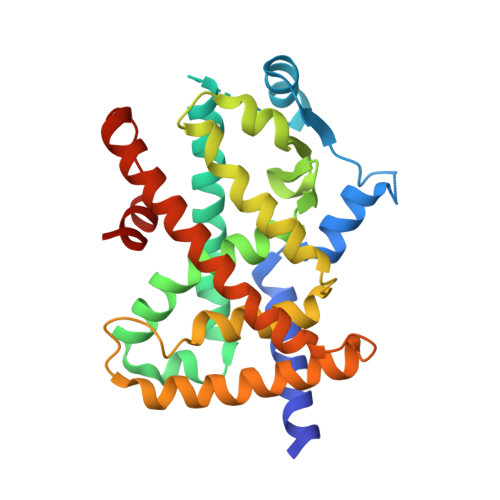Structural Insights into the Loss-of-Function R288H Mutant of Human PPAR gamma.
Egawa, D., Ogiso, T., Nishikata, K., Yamamoto, K., Itoh, T.(2021) Biol Pharm Bull 44: 1196-1201
- PubMed: 34471047
- DOI: https://doi.org/10.1248/bpb.b21-00253
- Primary Citation of Related Structures:
7E2O - PubMed Abstract:
Peroxisome proliferator-activated receptor gamma (PPARγ) is a nuclear receptor and the molecular target of thiazolidinedione-class antidiabetic drugs. It has been reported that the loss of function R288H mutation in the human PPARγ ligand-binding domain (LBD) may be associated with the onset of colon cancer. A previous in vitro study showed that this mutation dampens 15-deoxy-Δ 12,14 -prostaglandin J2 (15d-PGJ2, a natural PPARγ agonist)-dependent transcriptional activation; however, it is poorly understood why the function of the R288H mutant is impaired and what role this arginine (Arg) residue plays. In this study, we found that the apo-form of R288H PPARγ mutant displays several altered conformational arrangements of the amino acid side chains in LBD: 1) the loss of a salt bridge between Arg288 and Glu295 leads to increased helix 3 movement; 2) closer proximity of Gln286 and His449 via a hydrogen bond, and closer proximity of Cys285 and Phe363 via hydrophobic interaction, stabilize the helix 3-helix 11 interaction; and 3) there is steric hindrance between Cys285/Gln286/Ser289/His449 and the flexible ligands 15d-PGJ2, 6-oxotetracosahexaenoic acid (6-oxoTHA), and 17-oxodocosahexaenoic acid (17-oxoDHA). These results suggest why Arg288 plays an important role in ligand binding and why the R288H mutation is disadvantageous for flexible ligand binding.
Organizational Affiliation:
Laboratory of Drug Design and Medicinal Chemistry, Showa Pharmaceutical University.














